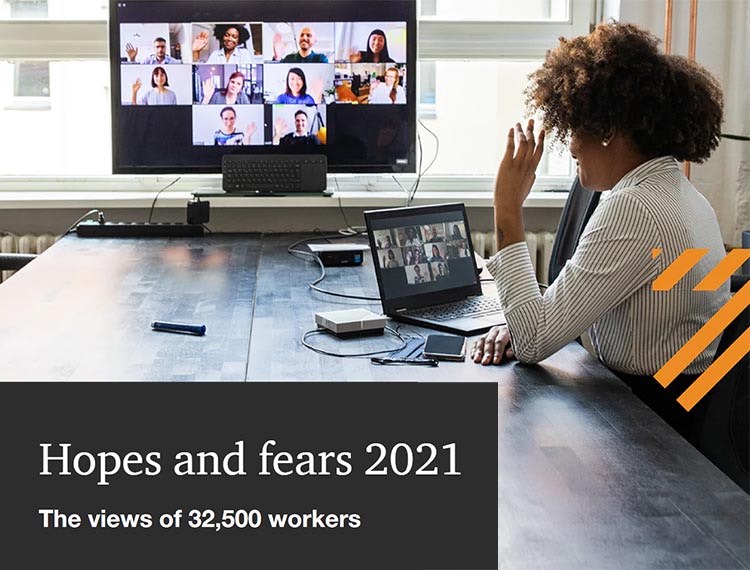Workers want more digital skills, more inclusivity, and more flexibility

In @PwC’s Upskilling hopes and fears 2021, one of the largest global surveys of workers, people revealed a mostly optimistic story, but one with some concerning undercurrents.
Workers reported feeling excited or confident about the future.
Most said they believe they can meet the challenges of automation — and they proved it during the pandemic: by learning new digital skills and by quickly adapting to remote work.
Yet many people think their job is at risk, and half of all respondents feel they’ve missed out on career opportunities or training due to discrimination.
PwC is committed to highlighting the issues surrounding the digital divide and the societal and economic benefits of greater private-public collaboration on upskilling and reskilling.
There’s a lot more to do to create more diverse, inclusive workplaces that allow everyone to give their best.
People are concerned about job security
-
60% are worried that automation is putting many jobs at risk.
-
48% believe traditional employment won’t be around in the future, and that we’ll sell our skills on a short-term basis to those who need them.
-
56% think few people will have stable, long-term employment in the future; this jumps to 81% in India.
-
61% feel that their government should act to protect jobs, with that feeling being more acute among 18-34 year-olds (66%) than those over 55 (51%).
-
39% think it’s likely that their job will be obsolete within five years.
The pandemic has already disrupted whole industries, contributing to people’s anxiety about the future.
As companies accelerate their automation plans and many jobs continue to be remote, employees across every sector will need to acquire new skills that enable them to think and work in different ways. The future isn’t a fixed destination. We need to plan for dynamic rather than static tomorrows.
Workers want to reskill
-
40% of workers successfully improved their digital skills during the pandemic.
-
77% are ready to learn new skills or completely retrain.
-
74% see training as a matter of personal responsibility.
-
80% are confident they can adapt to new technologies entering their workplace, with a large majority of people in India (69%) and in South Africa (66%) saying they are very confident, but only 5% in Japan say they are very confident.
-
46% of people with postgraduate degrees say their employer gives them opportunities to improve their digital skills, but just 28% of people with school-leaver qualifications say the same. Industries like retail or transport, which are most at risk of disruption, score just 25% and 20% respectively; banking scores 42%.
-
Younger people are twice as likely as older people to get opportunities to improve skills, and people in cities are 1.5 times as likely as people in towns.
-
49% of respondents are focused on building entrepreneurial skills with an interest in setting up their own business, a trend most prominent in Saudi Arabia (82%), South Africa (82%), India (79%), and Qatar (79%).
In one of the pandemic’s positive surprises, people who were given the chance proved they could transition quickly to remote work while keeping productivity high.
Where access exists, workers are keen to reskill as needed, but disparities in access to training remain. Those who most need digital skills are still the least likely to get them and, if this trend continues, we risk widening the digital divide. Leaders need to create more inclusive opportunities to upskill.
Bhushan Sethi, Joint Global Leader, People and Organisation, PwC United States, said:
“If current patterns in access to training persist, upskilling will increase social inequality when it should be doing precisely the opposite.”
Discrimination at work is holding people back
-
50% of workers say they’ve faced discrimination at work, which led to them missing out on career advancement or training.
-
22% were passed over because of their age — with younger workers just as likely as older people to be affected.
-
13% report missing out on opportunities as a result of ethnicity.
-
14% of workers have experienced discrimination on the grounds of gender, with women twice as likely to report gender discrimination as men.
-
13% report discrimination on the basis of social class or background.
The pandemic illuminated racial inequities and social tensions around the world. It also reversed progress toward gender equality, as many more women than men have left the labour market over the past year. At the same time, many younger workers are not being given opportunities to rise in an organisation.
There’s a real need to open up genuine, fully inclusive conversations about how to build more diverse and purpose-led workplaces. Companies need to ask tough questions and really consider the answers they’re getting. And not just because it’s the right thing to do; it’s also good for business. A diverse workforce and deliberate inclusion efforts help drive better outcomes—through different perspectives, creative thinking, and open collaboration—that can lead to the broader economic development of our society, which benefits everyone.
People want to work for purpose-driven companies — but not at any price
-
75% of respondents say they want to work for an organisation that will make a positive contribution to society. This feeling was especially acute in China (87%), India (90%), and South Africa (90%).
-
If forced to choose, 54% say they’d choose to maximise income while 46% say they’d choose a job that makes a difference over more money.
-
57% of those between the ages of 18 and 34 would choose to maximise their income.
A large majority of people want a job with a sense of purpose. This is not just about attracting younger talent; it matters up and down the age scale. But economic realities, of course, have an impact too, so it is important to think about how purpose and economic success work together.
Peter Brown, Joint Global Leader of PwC’s People and Organisation practice, said:
“Focusing on societal impact and maximising profit are not mutually exclusive. Being a purpose-led business can actually help boost your bottom line.”
Remote work is in demand
-
Only 9% of those who can work remotely want to go back to a traditional commute and work environment full time.
-
72% of respondents who can work remotely say they prefer a mixture of in-person and remote working.
-
19% would be happy to not return to an office at all and work entirely remotely.
-
Workers in metropolitan areas (66%) are more likely to work in roles that could allow remote working than those who live in rural areas (44%).
-
51% think tech breakthroughs will transform the way people work over the next three to five years.
-
44% of workers would agree to let their employer use technology to monitor their performance at work, including sensors and wearable devices, with 31% against it.
-
But 41% of respondents say that they are unwilling to give their employer access to their personal data, including social media profiles, with only 35% willing.
A remarkably low percentage of people who find that they can work remotely want to go back to the office full time. With that in mind, most companies are planning to maintain at least some virtual work or flextime. More than half expect remote working to be a permanent part of their workforce strategy. And as a consequence, they’ll need different kinds of physical space.
As leaders reimagine the offices of tomorrow, we expect the focus to be on increasing space where people can initiate, develop, and strengthen relationships. Where they can experience the culture and brand. And of course, where teams come together to brainstorm, collaborate, and problem solve.
Chaitali Mukherjee, People and Organisation, Upskilling and HR Transformation Leader, PwC India, said:
“Remote working is just going to be part of how we do business in the future. With ongoing investments in technology, virtual collaboration will become a seamless part of the employee experience.”
Methodology: In February 2021, PwC commissioned a survey of 32,517 members of the general public. Respondents included workers, business owners, contract workers, students, unemployed people looking for work, and those on furlough or who were temporarily laid off. The survey polled workers in 19 countries: Australia, Canada, China, France, Germany, India, Japan, Kuwait. Malaysia, Netherlands, Poland, Qatar. Saudi Arabia. Singapore, South Africa, Spain, UAE, UK, US.
UK workers eager to upskill due to #automation

9 Sept 2019: Research from PwC reveals that, despite an appetite and willingness to learn new skills in the face of increasing automation, many UK workers are not being offered upskilling opportunities by their employers, which is leading to mistrust and fear of automation and technology.
The Upskilling Hopes and Fears 2019 research – which surveyed more than 22,000 people in 11 markets – indicates that three-quarters (73%) of UK workers would take the opportunity to better understand or use technology if they were given the option by their employer. However, currently only 49% of workers say their employer is giving them the chance to improve their digital skills outside their normal duties, with a mere 14% saying that they are given many opportunities. This suggests why 58% of UK adults fear that automation is putting jobs at risk, with Brits the most likely out of the populations surveyed to believe that automation presents more risks than opportunities – a direct contrast to adults in India and China (even adjusting for cultural differences in responses), where seven in ten think automation presents more opportunities than risks.
Of the countries surveyed, UK workers – followed by their Australian counterparts – were found to be offered the fewest opportunities to upskill and, consequently, only half feel well equipped to use new technologies entering the workplace. Unsurprisingly, the markets who are best at adopting upskilling are also the markets who feel most well equipped in using new technologies entering their workplace: India (91%), South Africa (80%) and China (78%).
Kevin Ellis, Chairman of PwC UK, commented:
“The mismatch between the skills people have and those needed for the digital world is a major global challenge. While technology will likely create as many jobs as it displaces, people need to learn new skills and develop their understanding in order to adapt. Without combined efforts from governments, businesses and NGOs, swathes of people risk being left behind, exacerbating social and economic inequalities. The UK’s track record in education and innovation means we’re phenomenally well placed to step up and take action.”
These results highlight the need for organisations to look seriously at offering upskilling opportunities for staff. Over half of adults (56%) believe that over the next decade technology will change their current job, with 29% believing that that their jobs will be significantly changed or obsolete as a result of automation.
According to the report, over half of UK adults (54%) say that they are ready to learn new skills or completely re-train in order to improve their future employability (only 11% say they are not). Workers would be prepared to do a number of things if they believed their job was at risk of being replaced by automation, including: take part time training (73%), take full time training (49%), start their own business (41%), accept a lower level position in another company or industry (39%), and accept a position with a lower salary than their previous job (33%).
Carol Stubbings, Global Head of People and Organisation at PwC , added:
“Organisations need to seize on people’s appetite to learn new skills. Too often assumptions are made about the type of worker who should be upskilled, so the opportunities are not evenly spread. The Government’s National Retraining Scheme is a positive step forward – there’s a huge amount to be done.”
The research highlights disparities in upskilling opportunities by gender, education, and age. Over half (54%) of men surveyed say their employer is giving them the chance to learn new skills, as opposed to only 45% of women. Over half of women (55%) say they are offered no opportunities at all. In addition, the research suggests a higher education also leads to more upskilling opportunities – 56% of university graduates say they are offered them, whereas only 41% of those educated to school leaver level say the same.
Older generations are also at risk of losing out to their younger counterparts – 64% of workers aged 18-34 say they are offered opportunities, compared with 48% of 35-54 year olds and 41% of ages 55 and over. Younger generations are thus the most optimistic, with 73% of 18-34 year olds concluding that technology will make their work better, compared to only 47% of ages 55 and over.
The survey builds on PwC analysis showing that 30% of jobs could be impacted by automation by the mid-2030s. Meanwhile, PwC’s annual CEO survey shows that the availability of skills is a top concern for 79% of CEOs
The Upskilling Hopes and Fears survey was carried out by Opinium for PwC. More than 22,000 people were surveyed globally. The sample size in the UK consisted of 2004 adults ranging from ages 18-65, excluding retirees. Other countries surveyed were: USA, Germany, Netherlands, India, Australia, France, Singapore, China, South Africa, Poland. In total 22094 adults were surveyed.
How will automation impact jobs?

01 Feb 2018: PwC have analysed over 200,000 jobs in 29 countries to explore the economic benefits and potential challenges posed by automation, “Will robots really steal our jobs? An international analysis of the potential long term impact of automation” (Feb 2018).
AI, robotics and other forms of smart automation have the potential to bring great economic benefits, contributing up to $15 trillion to global GDP by 2030 according to PwC analysis, “Global Artificial Intelligence Study: Exploiting the AI Revolution”.
This extra wealth will also generate the demand for many jobs, but there are also concerns that it could displace many existing jobs.
We have analysed in detail the tasks involved in over 200,000 existing jobs across 29 countries to assess what the potential for automation may be at various points over the next 20 years.
We identify three waves of automation that might unfold over this period:
- Wave 1 (to early 2020s): algorithmic
- Wave 2 (to late 2020s): augmentation
- Wave 3 (to mid-2030s): autonomy
During the first wave, we expect relatively low displacement of existing jobs, perhaps only around 3% by the early 2020s. But job displacement could increase in later waves as these technologies mature and are rolled out across the economy in increasingly autonomous form.
By the mid-2030s, up to 30% of jobs could be automatable, with slightly more men being affected in the long run as autonomous vehicles and other machines replace many manual tasks where their share of employment is higher. During the first and second waves, however, women could be at greater risk of automation due to their higher representation in clerical and other administrative functions (see chart).
These estimates are median values across 29 countries, with the UK being very close to the average. Long-term automation could be lower at only around 20-25% in Asian and Nordic countries, but could be higher at over 40% in some Eastern European countries according to our analysis.
Explore the results further for your country using our data analysis tool.











Responses